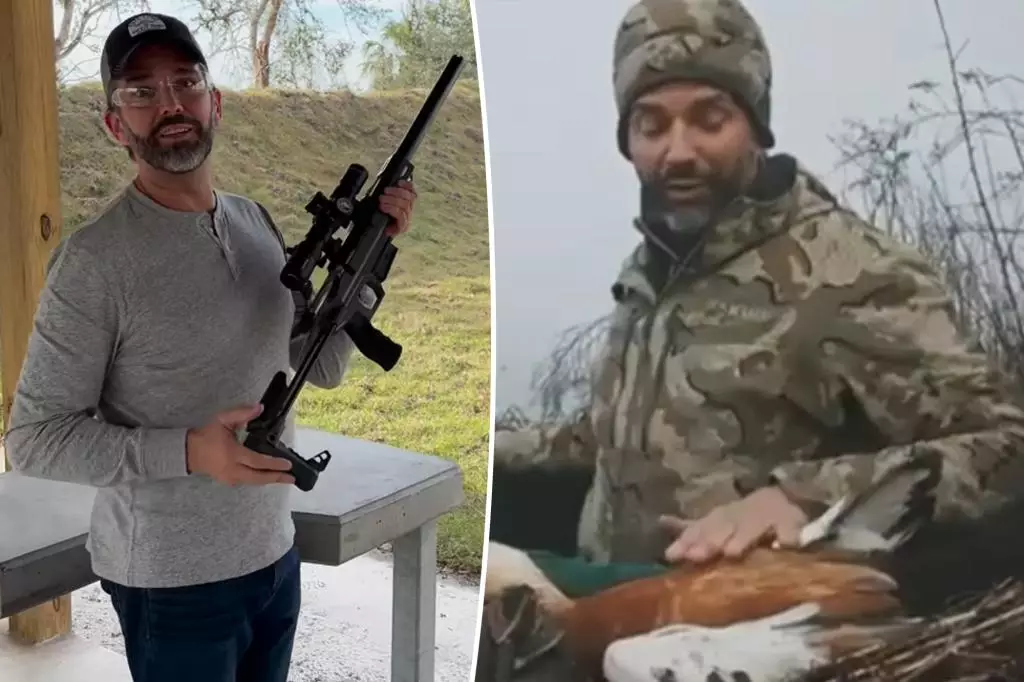Donald Trump Jr.’s recent hunting expedition in Italy has ignited a significant backlash from animal rights activists and local politicians, posing numerous ethical and legal questions surrounding the event. The uproar centers on a video released by Trump Jr.’s platform, Field Ethos, in which he reportedly participates in duck hunting near Venice, raising concerns over the legality of hunting for non-residents and the potential consequences of killing a rare bird.
The issue surfaced after a video showcasing Trump Jr. hunting ducks was shared on his official website. In the footage, Trump Jr., adorned in camouflage gear, appears to be part of a group engaged in shooting ducks. This depiction, however, drew immediate scrutiny when it became evident that one of the ducks killed might belong to a rare species, raising alarms among conservationists and the general public. Notably, the video was later removed, amplifying speculation about its content and the ethics of the hunt itself.
Observers raised eyebrows particularly at the mention of an “uncommonly colored” duck that could potentially be identified as a Ruddy Shelduck, which is relatively rare in Europe. This detail prompted alarm from environmental groups and local legislatures, who are now calling for formal investigations into not just the legality of the hunt but also the potential impact on local wildlife.
The political ramifications were swift. Italian lawmakers quickly asserted that foreign nationals, including Trump Jr., are subjected to strict hunting regulations in Italy, which fundamentally state that only residents of certain regions can legally hunt within the country. Andrea Zanoni, a member of Italy’s Green Party, voiced strong objections, emphasizing that legislation mandates hunting licenses issued exclusively to residents. He highlighted this endeavor’s potential illegality and even lodged a complaint with local authorities.
Moreover, environmental advocates are pressing for transparency around the hunting practices displayed in the video. The claim that food chains and wildlife ecosystems could be threatened by such actions fuels an ongoing debate about hunting ethics, particularly in a country renowned for its biodiversity. Such issues resonate not only in the hearts of local activists but also highlight the broader conversations surrounding the responsibilities of individuals with influence in preserving wildlife.
In response to growing backlash, Trump Jr.’s spokesperson, Andy Surabian, went into damage control mode, asserting that all necessary permits were acquired and that the hunting activity occurred in a legally sanctioned area. Surabian also claimed the group operates within the bounds of appropriate conservation practices, denoting a careful compliance with regulations throughout the event. Furthermore, he indicated uncertainty surrounding the circumstances of the rare duck’s death, suggesting it may have been mishandled, rather than specifically associated with Trump Jr.
Nonetheless, this defense has not quelled criticism. Many activists and members of the public perceive such reassurances as inadequate given the potential ramifications of killing a protected species. The insistence on legal hunting practices contradicted by the event’s focal point—the elimination of rare wildlife—has left many advocating for stricter interpretations of existing wildlife conservation laws.
Interestingly, this hunting episode is not the first time Donald Trump Jr. has found himself entangled in a scandal surrounding wildlife conservation. Back in 2019, he faced backlash for an alleged hunt of an endangered sheep in Mongolia, which he was permitted to retroactively hunt under special allowances. Such incidents draw consistent criticism from both animal rights activists and environmentalists because they encapsulate a deep-seated concern regarding high-profile figures engaging in wildlife hunting under layered legal exemptions.
In many ways, the current furor over duck hunting in Italy highlights a broader question about conservation ethics, legality, and celebrity accountability in the hunting world. As the situation continues to unfold, the implications may sharpen the debate on wildlife protection in Italy and beyond, forcing the public to consider the intricate relationship between privilege, law, and nature.
As the investigation into Trump Jr.’s hunting activities unfolds, it is imperative to recognize not only the immediate consequences of such actions on local wildlife but also the far-reaching implications for hunting regulations, conservation ethics, and public accountability in the realm of environmental protection. The future of wildlife conservation relies on responsible engagement from everyone—especially those in positions of influence.

